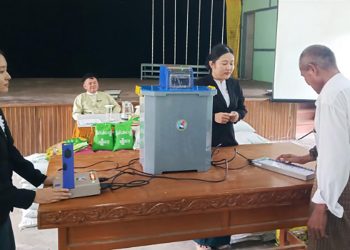YANGON — Myanmar’s Ministry of Health and Sports has ordered Yangon to shut down small shops and businesses which are not following COVID-19 rules.
In better news, Myanmar’s watermelons are set to be exported to Qatar and the United Arab Emirates (UAE) and avocado farmers say they have increased cultivation and are looking to sell to the European Union.
Elsewhere, rice exporters are planning to seek government help after a Chinese trader disappeared with more than 2.6 billion kyats (nearly US$2 million) worth of their rice.
The World Bank’s latest survey on Myanmar also said the economic impact of the second wave of COVID-19 has been more severe on businesses than the first, with more firms not expecting to recover.
New watermelon markets
The Watermelon and Muskmelons Producers and Exporters Association said Myanmar will export the capacious fruit to the UAE for the first time.
A container of 25 tonnes of watermelons will be shipped to the UAE on December 13, the association said. Moreover, the government is seeking to export to Hong Kong.
Watermelons grow in Sagaing, Mandalay and Bago regions. China has been the largest market but producers have suffered severe losses because of China’s frequent border closures and trade restrictions due to COVID-19.
The association said Myanmar normally exports more than 800,000 tonnes of watermelons to China per year.
Avocados destined for EU
Myanmar Avocado Producers and Exporters Association has urged growers to expand cultivation with pedigree plants to address the coronavirus downturn.
The association said avocados were exported to the UK recently and received good feedback for quality. Germany and Italy are now proposing to buy avocados from Myanmar.
The association is expected to export more than 30 tonnes of avocados to the European Union in late December.
Myanmar rice exporters’ fraud claims
Myanmar rice traders plan to seek help from the Ministry of Commerce and the Chinese authorities after a Chinese trader disappeared without paying for more than 2.6 billion kyats worth of their rice, according to the rice wholesale center in Muse, Myanmar’s largest trading hub on the Chinese border.
The trader, Luo Jianfang, who also owes more than 8 billion kyats (US$6 million) to Chinese traders based in Ruili, Yunnan province, holds shares in several trading firms, one of which is closely linked to the Chinese government organ responsible for managing state-owned enterprises.
Luo, who represents Zhongshang Affiliates (Zhong Shang Lian Hang), disappeared without transferring payment after receiving more than 2.6-billion-kyat worth of rice from Myanmar’s traders, U Min Thein, the vice-chairman of the Muse Rice Wholesale Center in Shan State, told The Irrawaddy.
U Min Thein said Luo had been purchasing rice from traders in Myanmar for more than six months. He said many traders favored his company because it purchased at a higher price compared to other Chinese companies.
No traders from Myanmar or China have had any contact with Luo since Dec. 2.
The Ministry of Commerce said it is awaiting details from the rice traders before opening negotiations with China.
COVID-19 endangers numerous businesses
The World Bank’s latest survey on Myanmar said nearly half of all businesses in the manufacturing and service sectors do not expect to recover from the economic effects of the pandemic.
The survey said firms in the agriculture, manufacturing, wholesale and retail, and service sectors remain less optimistic of recovery during the second wave of COVID-19. It said the proportion of firms not expecting to recover reached 41 percent in October, up from 29 percent in May.
A reduction in sales is the top concern of businesses in the country. Declining sales were a concern for 96 percent of responding firms in October, up 11 percentage points from May, the study said.
The sales outlook for the next three months also remained negative, with sales expected to decline by an average of 26 percent from the same period a year ago. Firms in the service sector expect the decline to be 41 percent on average, while those in retail and wholesale expect a 21-percent decline, the World Bank said.
It added that more than half of the firms involved in agriculture expect to fall into arrears over the next three months.
You may also like these stories:
COVID-19 Taking Huge Toll on Myanmar Manufacturing, Service Sectors, World Bank Says
Myanmar Rice Exporters Seek Govt Help After Chinese Trader Flees Owing Millions of Dollars
Myanmar’s Second Investment Policy Review Urges Further Liberalization

















